Layoffs, Corporate Spy Scandals And Allegations Of Price
Gouging
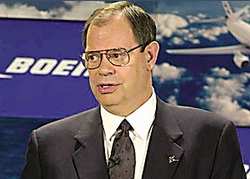 See that guy over in
the corner of the restaurant, eating by himself? Looks like he's
been at the office too long, doesn't it? See the circles under his
eyes? He's just a bit overworked and more than a bit worried right
now.
See that guy over in
the corner of the restaurant, eating by himself? Looks like he's
been at the office too long, doesn't it? See the circles under his
eyes? He's just a bit overworked and more than a bit worried right
now.
That guy in the booth by himself, nursing a Bromo-Seltzer, is
Boeing CEO Phil Condit. He has a lot on his mind. For instance:
America's biggest commercial airplane maker is laying off up to
five-thousand workers before the end of 2003. That drops
significantly of people employed by Boeing to make aircraft for the
commercial market. Two fired managers have been indicted for
stealing Lockheed-Martin documents that may have helped Boeing win
an important space launch contract with the government. On Capitol
Hill, Boeing is under fire from Senators who accuse the airplane
maker of gouging the Air Force in a proposed contract to sell the
government 100 767s modified as refueling tankers. See that man in
the restaurant booth over there?
He just ordered another Bromo-Seltzer.
Layoffs And A Threat From Airbus
For the first time this year, Boeing's arch-rival, Airbus, plans
to out deliver the Chicago-based US company. At last month's Paris
Air Show in Le Bourget, France, Airbus announced it will fill 300
orders this year. Boeing has said it expects to deliver about
280 planes by the end of the year. But that projection was made
before Wednesday's announcement from Continental Airlines that it
has delayed delivery of at least 36 new aircraft from Boeing.
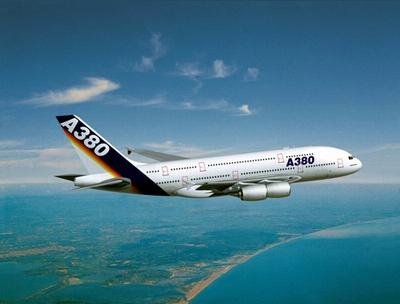
KC-767 Scandal?
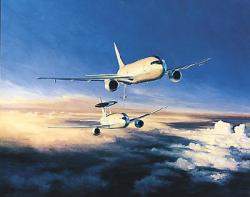 Boeing has problems elsewhere. The
Senate Commerce Committee and its chairman, John McCain (R-AZ)
threaten to subpoena Boeing documents regarding a planned purchase
by the Air Force of up to 100 modified 767s to replace an over aged
refueling fleet where the average aircraft is 43 years old.
Boeing has problems elsewhere. The
Senate Commerce Committee and its chairman, John McCain (R-AZ)
threaten to subpoena Boeing documents regarding a planned purchase
by the Air Force of up to 100 modified 767s to replace an over aged
refueling fleet where the average aircraft is 43 years old.
"We've received information from outside sources that Boeing
offered this same aircraft at a much lower price to airlines in
foreign countries," said McCain, a former Navy pilot and Vietnamese
POW.
"We don't know if that's true or not." The lease deal between
Boeing and the Air Force would cost taxpayers approximately $17.2
billion.
"I would point out that we asked for the information over a
month and only two days ago did we receive the first piece of
paper," McCain said at a committee hearing Thursday.
A spokesman for Boeing promised the nation's biggest aircraft
maker would comply with McCain's request. The committee has decided
to give Boeing another week before it revisits the possibility of
formally demanding the documentation.
And Then There's The Lockheed-Martin Allegation
 On another front, Boeing
has tapped former US Senator Warren Rudman to lead an investigation
into charges that two Boeing managers conspired to steal secrets
from Lockheed-Martin in 1997 and 1998. Already, two Boeing managers
have been fired and brought up on federal charges for their alleged
part in the scandal. Kenneth Branch, 64, and William Erskine, 43,
for the misuse of proprietary Lockheed Martin Co. documents during
bidding for Air Force launch contracts. The two, who were managers
in the Evolved Expendable Launch Vehicle (EELV) program, were
charged with conspiracy to conceal and possess trade secrets by a
federal grand jury in Los Angeles. If convicted, both men face a
maximum of 10 years confinement and a fine of $250,000, or
both.
On another front, Boeing
has tapped former US Senator Warren Rudman to lead an investigation
into charges that two Boeing managers conspired to steal secrets
from Lockheed-Martin in 1997 and 1998. Already, two Boeing managers
have been fired and brought up on federal charges for their alleged
part in the scandal. Kenneth Branch, 64, and William Erskine, 43,
for the misuse of proprietary Lockheed Martin Co. documents during
bidding for Air Force launch contracts. The two, who were managers
in the Evolved Expendable Launch Vehicle (EELV) program, were
charged with conspiracy to conceal and possess trade secrets by a
federal grand jury in Los Angeles. If convicted, both men face a
maximum of 10 years confinement and a fine of $250,000, or
both.
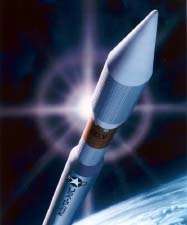 Observers say Lockheed only got the
remaining seven launches because the Air Force wanted to keep both
America's major aerospace defense contractors involved.
Observers say Lockheed only got the
remaining seven launches because the Air Force wanted to keep both
America's major aerospace defense contractors involved.
But firing Erskine and Branch may not be enough for
Air Force investigators. If they find that Boeing did help or
encourage the theft of Lockheed secrets during the sensitive
bidding process, the Chicago-based company could face government
sanctions, or, in a worst-case scenario, be barred from competing
for bids in the future.
That prospect must be keeping Boeing executives up late at
night, given the fact its aerospace division is bidding on an
additional 20 EELV missions worth more than a billion dollars.
Boeing's Commercial Satellite Business Is Going Out Of
Business
That kind of money in Boeing's launch business would
go a long way to offset the $1.1 billion charge-off its satellite
operations are expected to face at the end of the third quarter.
The dot-bomb debacle and the continuing slow recovery from 9/11
have reduced demand for transponder space to virtually nil. As a
result, Boeing today said it was getting out of the commercial
launch business and would focus its orbital efforts solely on
government satellite contracts.
There is the 7E7 project. The Dreamliner has generated a lot of
market interest with its promise of 20% lower operating costs. But
Boeing has to get from here to there and economic experts almost
guarantee the road is going to be rough -- even without government
investigations and congressional subpoenas. "The market's obviously
very difficult," said Chris Tarry, an independent airline analyst
based in London, as quoted by Reuters. "It's probably four years
away before any significant upturn" in demand for new iron. Waiter,
send another glass of Bromo-Seltzer to CEO Phil Condit's table...
with our regards.
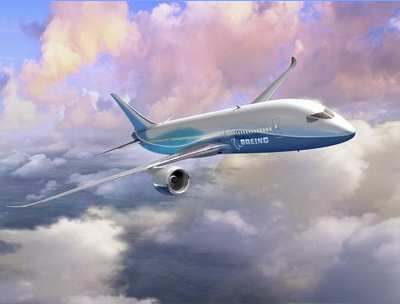
 ANN's Daily Aero-Term (12.14.25): Local Airport Advisory (LAA)
ANN's Daily Aero-Term (12.14.25): Local Airport Advisory (LAA) Airborne 12.08.25: Samaritans Purse Hijack, FAA Med Relief, China Rocket Fail
Airborne 12.08.25: Samaritans Purse Hijack, FAA Med Relief, China Rocket Fail ANN's Daily Aero-Linx (12.15.25)
ANN's Daily Aero-Linx (12.15.25) Airborne 12.10.25: New Gulfstream, ATC Integrator, Outrageous FFZ User Fees
Airborne 12.10.25: New Gulfstream, ATC Integrator, Outrageous FFZ User Fees Airborne-NextGen 12.09.25: Amazon Crash, China Rocket Accident, UAV Black Hawk
Airborne-NextGen 12.09.25: Amazon Crash, China Rocket Accident, UAV Black Hawk








